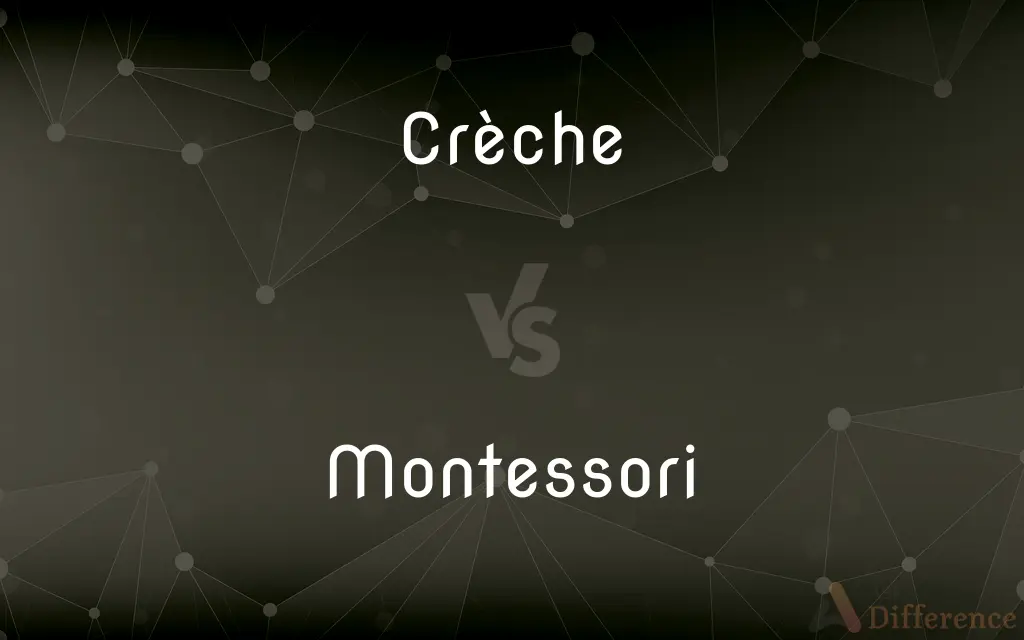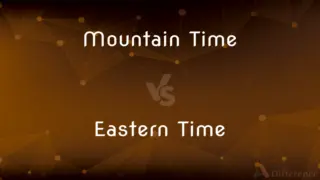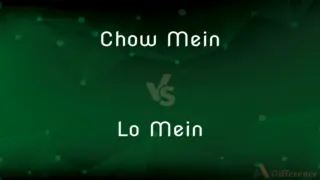Crèche vs. Montessori — What's the Difference?
Edited by Tayyaba Rehman — By Fiza Rafique — Published on November 5, 2023
Crèche is a daycare for young children, while Montessori is an educational approach focused on child-led learning. Both cater to kids, but their functions differ.

Difference Between Crèche and Montessori
Table of Contents
ADVERTISEMENT
Key Differences
Crèche and Montessori are both institutions that cater to children but serve distinct purposes. A crèche primarily offers care and supervision for infants and young children, especially when their parents are at work or otherwise engaged. Montessori, on the other hand, is an educational method developed by Maria Montessori, emphasizing self-directed activity and hands-on learning.
When parents think of a crèche, they often visualize a place where their child can be safely looked after for a few hours. These establishments prioritize child safety and comfort, ensuring kids have an environment that feels like a second home. Montessori institutions, conversely, are structured classrooms where children are provided tools and activities that promote independent thinking and self-exploration.
Parents who choose a crèche are typically looking for short-term child care solutions, perhaps due to work commitments. They want a space where their child can interact with peers, play, and remain safe. Those opting for Montessori education value the unique pedagogical approach it offers, hoping their children gain a love for learning and a sense of independence.
Another difference between a crèche and Montessori is their duration and timing. Crèches might operate for the whole day, offering flexibility for working parents. Montessori schools have specific school hours, and while they do care for the child's well-being, their primary goal is education.
In summary, while both crèche and Montessori serve children, their core objectives differ. Crèche is more about care, while Montessori is centered around a specific educational methodology.
ADVERTISEMENT
Comparison Chart
Purpose
Provides care and supervision for young children.
An educational approach focusing on child-led learning.
Duration
Can operate all day, flexible hours for parents.
Specific school hours, more structured.
Age Group
Infants and young children.
Typically preschool to elementary school-aged children.
Main Focus
Safety, comfort, and basic play activities.
Hands-on learning, self-exploration, and independent thinking.
Setting
More like a second home, less structured.
Structured classroom environment with specific learning tools.
Compare with Definitions
Crèche
An establishment that offers temporary childcare services.
The gym provides a crèche, so parents can exercise without worrying about their toddlers.
Montessori
A school or classroom environment implementing Montessori teaching principles.
At the Montessori, children choose their activities and learn at their own pace.
Crèche
A nursery where babies and toddlers are looked after, especially in churches or shopping centers.
The mall has a crèche, allowing parents to shop while their kids play safely.
Montessori
A pedagogical approach that prioritizes hands-on learning and independence.
The Montessori method has gained global recognition for its effectiveness in child education.
Crèche
A protective environment where young ones are nurtured and supervised.
The community center's crèche ensures all children have a safe space to learn and play.
Montessori
An educational method emphasizing child-led activities and self-exploration.
Lisa decided to enroll her daughter in a Montessori school to foster her love for learning.
Crèche
A place where young children are cared for during the day while their parents are working.
Jane drops her son off at the crèche every morning before heading to her office.
Montessori
A philosophy of education developed by Maria Montessori.
The Montessori approach believes in the natural curiosity and capabilities of every child.
Crèche
A representation of the Nativity scene with figurines.
Every December, our family sets up a crèche to celebrate Christmas.
Montessori
A system where teachers act as guides, allowing students to direct their own learning.
In the Montessori classroom, the educator observes and assists rather than instructs directly.
Crèche
A representation of the Nativity, usually with statues or figurines.
Montessori
Italian educator who developed a method of teaching mentally handicapped children and advocated a child-centered approach (1870-1952)
Crèche
A hospital for foundlings.
Crèche
Chiefly British A day nursery.
Crèche
Alternative form of crèche
Crèche
A public nursery, where the young children of poor women are cared for during the day, while their mothers are at work.
Crèche
A day-care center for young children.
Crèche
A three-dimensional model of the scene described in the Bible at the birth of Jesus Christ in a stable at Bethlehem, with Mary and Joseph near a manger in which a model of the infant Christ child is lain, and usually including figures of animals, shepherds, and the three wise men; - also called a Nativity scene. The figures in the scene are typically made as individual statues or figurines. Smaller models are displayed in homes and other indoor locations during the Christmans season, and larger models, often life-size, may be displayed out of doors.
Crèche
A nest where the young of several animals are cared for in a communal fashion.
Crèche
A hospital where foundlings (infant children of unknown parents) are taken in and cared for
Crèche
A representation of Christ's nativity in the stable at Bethlehem
Common Curiosities
What is a crèche primarily used for?
A crèche is primarily used for caring for young children, especially when parents are working or otherwise engaged.
Is Montessori a type of crèche?
No, Montessori is an educational method, while a crèche is a place that provides care and supervision for young children.
Can a Montessori school offer crèche services?
Some Montessori schools might offer extended care resembling a crèche, but their primary focus remains education.
What age groups are typically found in a crèche and Montessori?
Crèches usually cater to infants and young children, while Montessori often serves preschool to elementary school-aged children.
Are crèche staff required to have educational training like Montessori teachers?
While crèche staff prioritize childcare and safety, Montessori teachers undergo specific training in the Montessori method.
What's the main teaching philosophy of Montessori?
Montessori emphasizes child-led activities, hands-on learning, and fostering independence.
How does a crèche differ from a daycare?
A crèche is essentially a type of daycare, focusing on providing care and supervision for young children.
Is every crèche affiliated with a religious organization?
No, while some crèches, especially those in churches, might have religious affiliations, many are secular.
Who founded the Montessori method?
The Montessori method was founded by Maria Montessori.
Do crèches provide education like Montessori schools?
Crèches primarily focus on care and supervision, while Montessori schools emphasize education through a specific pedagogical approach.
Can I find a crèche in a shopping mall?
Yes, some shopping malls offer crèches to allow parents to shop while their kids are cared for.
Are Montessori schools religious?
The Montessori method itself is secular, but some Montessori schools might have a religious component depending on their establishment.
Share Your Discovery

Previous Comparison
Mountain Time vs. Eastern Time
Next Comparison
Chow Mein vs. Lo MeinAuthor Spotlight
Written by
Fiza RafiqueFiza Rafique is a skilled content writer at AskDifference.com, where she meticulously refines and enhances written pieces. Drawing from her vast editorial expertise, Fiza ensures clarity, accuracy, and precision in every article. Passionate about language, she continually seeks to elevate the quality of content for readers worldwide.
Edited by
Tayyaba RehmanTayyaba Rehman is a distinguished writer, currently serving as a primary contributor to askdifference.com. As a researcher in semantics and etymology, Tayyaba's passion for the complexity of languages and their distinctions has found a perfect home on the platform. Tayyaba delves into the intricacies of language, distinguishing between commonly confused words and phrases, thereby providing clarity for readers worldwide.













































